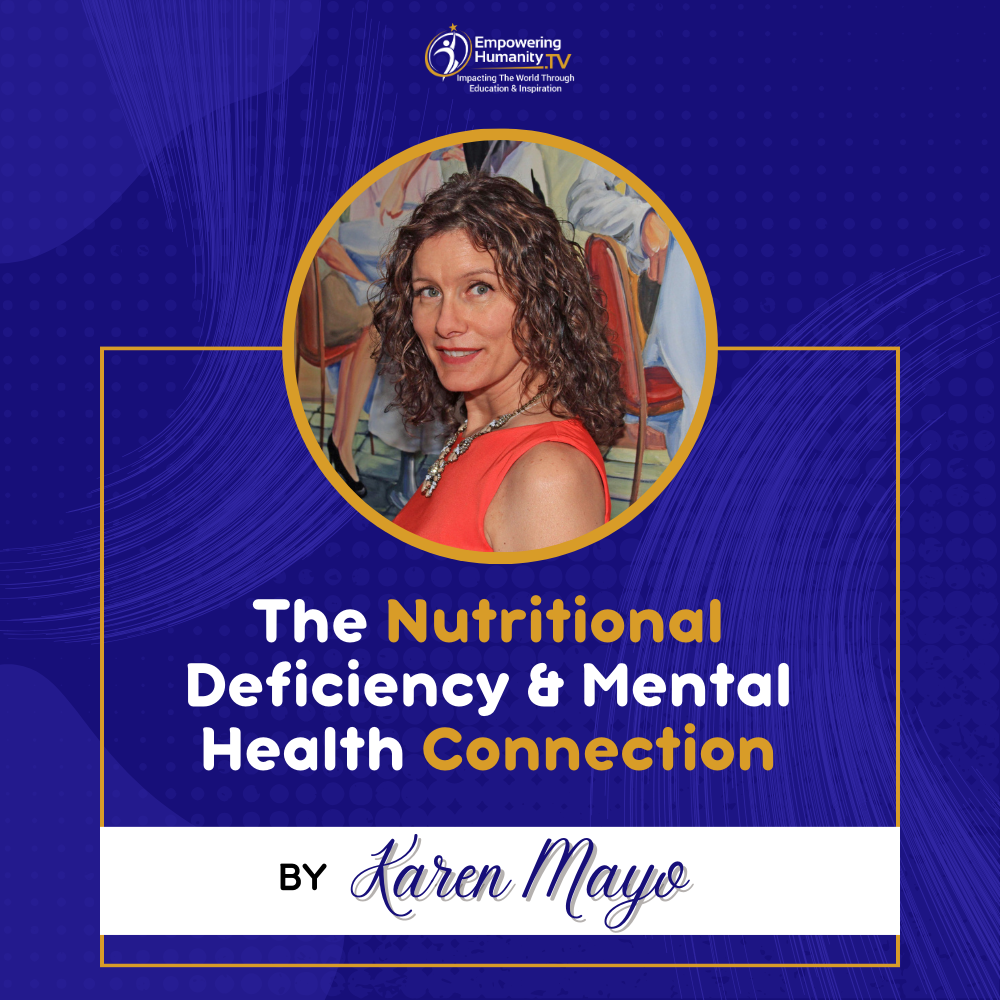The Nutritional Deficiency & Mental Health Connection By Karen Mayo
The way we eat matters. Whether we admit it or not, food affects our mental, physical and emotional well-being. But eating isn’t just about counting calories or eliminating fats or carbohydrates, rather it’s about understanding the scientific effects food has in our bodies and the larger picture of the food/body connection.
Mental and physical health can be dramatically improved with a nutrient-dense, healthy diet. Many times, deficiency of essential vitamins and minerals can inhibit brain function and increase symptoms of depression, and anxiety.
Understand the Signs of Nutritional Deficiencies
Mental health disorders can be caused by various factors such as psychological, biological, genetic, environmental, and circumstantial. Nutritional deficiencies are the most overlooked biological element to someone’s mental well-being.
The best way to know where your deficiency is, is to get a complete blood panel because it’s unique to each person. If your diet doesn’t comprise of nutrient-rich foods, consider nutritional supplements for the following top 5 nutrients needed for optimal brain function.
5 Nutrients Needed for Optimal Brain Function
Vitamin D regulates the production of adrenaline, noradrenaline, and dopamine, and plays a role as an important hormone for brain function. Vitamin D deficiency manifests in a variety of ways including fatigue, muscle weakness, hair loss, bone pain, and mood changes.
Foods to Recommend: A diet rich in vitamin D natural sources such as eggs, fatty fish such as sock-eyed salmon or trout, mushrooms, fortified foods like Basmati brown rice, goat cheese, and gluten-free oats should be consumed.
Vitamin B deficiency can contribute to depression, anxiety, and mood swings. It is associated with a disruption in the nervous system as well as the circulatory system.
Foods to Recommend: Folate is present in dark green vegetables, beans, peas, citrus fruits, and legumes such as lentils and garbanzo beans
The deficiency of magnesium is known to increase symptoms related to mental disorders, such as agitation, anxiety, confusion, insomnia, hallucinations, and depression.
Foods to Recommend: Include magnesium-rich foods, such as pumpkin seeds, dark organic chocolate at least 72%, and almonds, to help alleviate some stress during the day as a snack between breakfast and dinner.
Omega-3 fatty acids are vital for brain function, supporting mental sharpness, and positive mood. Symptoms of omega-3 fatty acid deficiency include fatigue, poor memory, dry skin, heart problems, mood swings or depression, and poor circulation.
Foods to Recommend: Oily fish such as sock-eyed salmon, and mackerel are a good source of omega-3 fatty acids. These healthy fats can also be found in flaxseed and walnuts.
Probiotics are the most ignored deficiency that creates the worst symptoms that affect millions of people worldwide. Probiotics are a mix of live bacteria and yeast that live naturally in the human gastrointestinal tract that promote healthy digestion, support a healthy response to stress, and promote positive mood. Mental health issues that have been linked to an unhealthy gut include ADD/ADHD, anxiety, depression, schizophrenia, and Alzheimer’s disease.
Physical issues include autoimmune problems, digestive issues, sleep issues, skin rashes, allergies, and the rollercoaster of sugar cravings.
Foods to Recommend: Probiotics support the important gut/brain connection.
Just like anything else please do due diligence, more is not always better.
***
Karen Mayo is an Award-winning international best-selling author of Mindful Eating, Amen Clinics Integrative Nutritionist, a board-certified integrative nutrition health and lifestyle coach, Sports nutritionist, the author of three books, a natural foods chef, and a certified clinical hypnotherapist.

